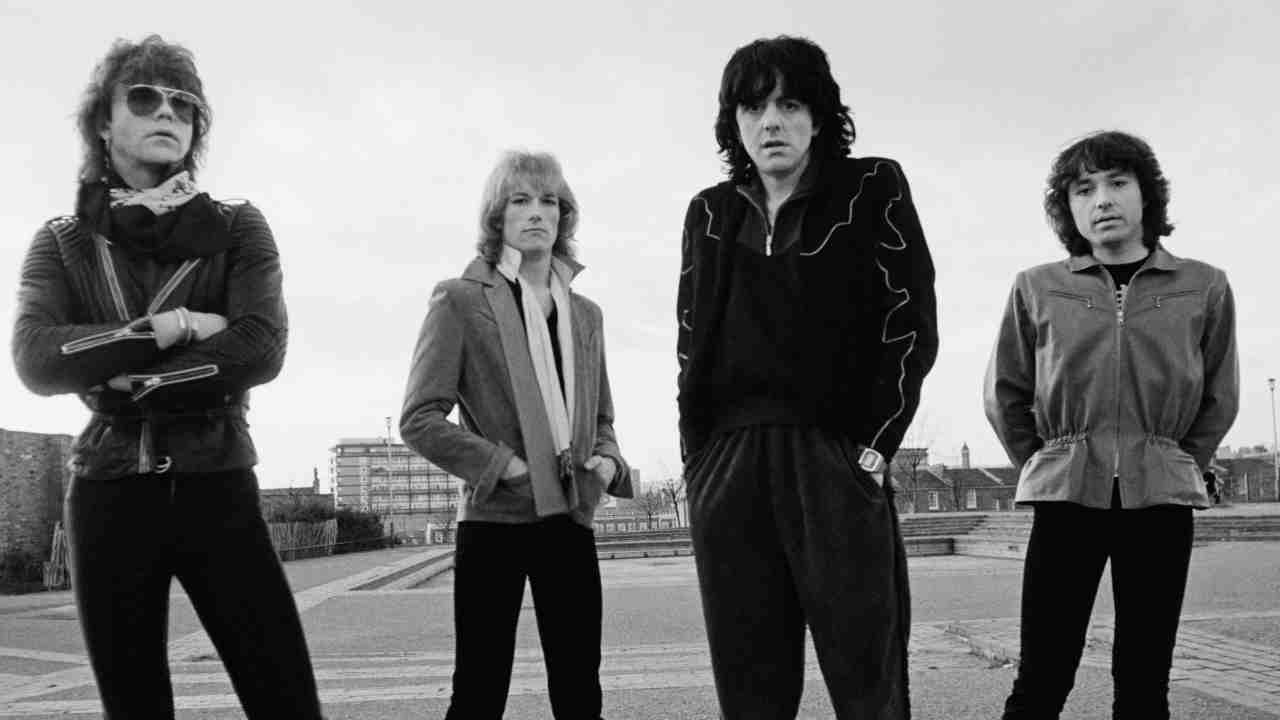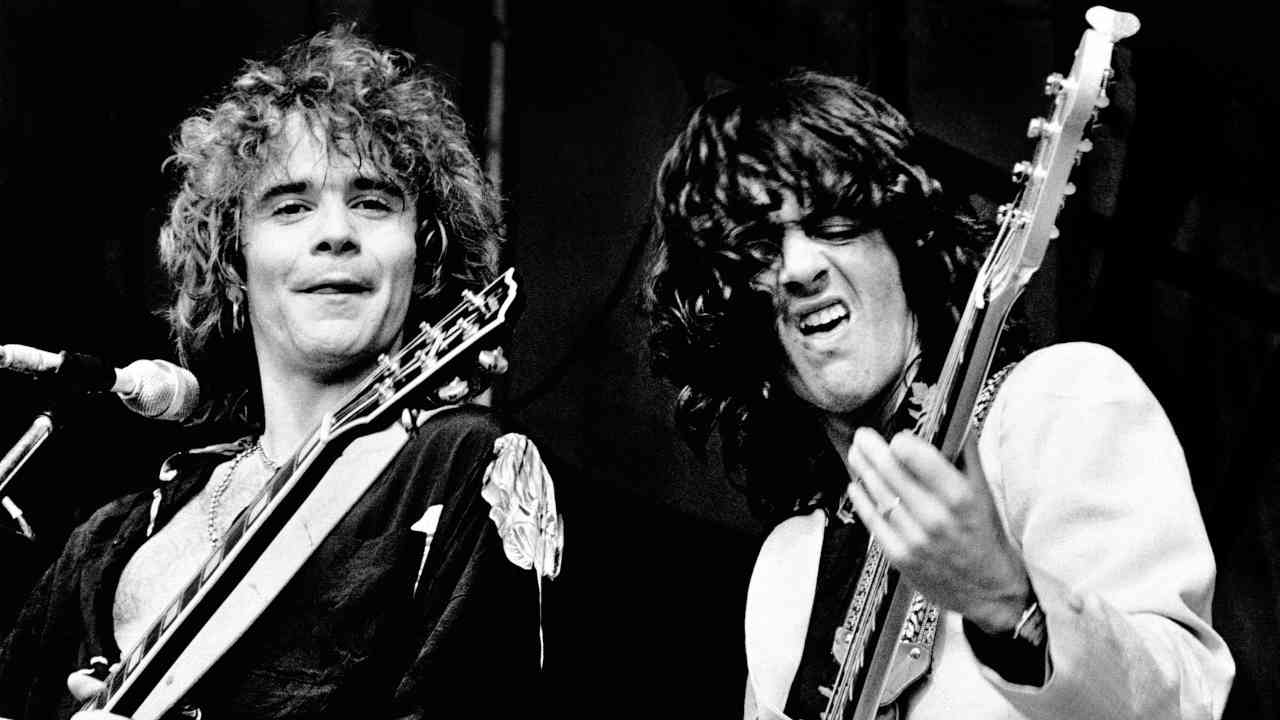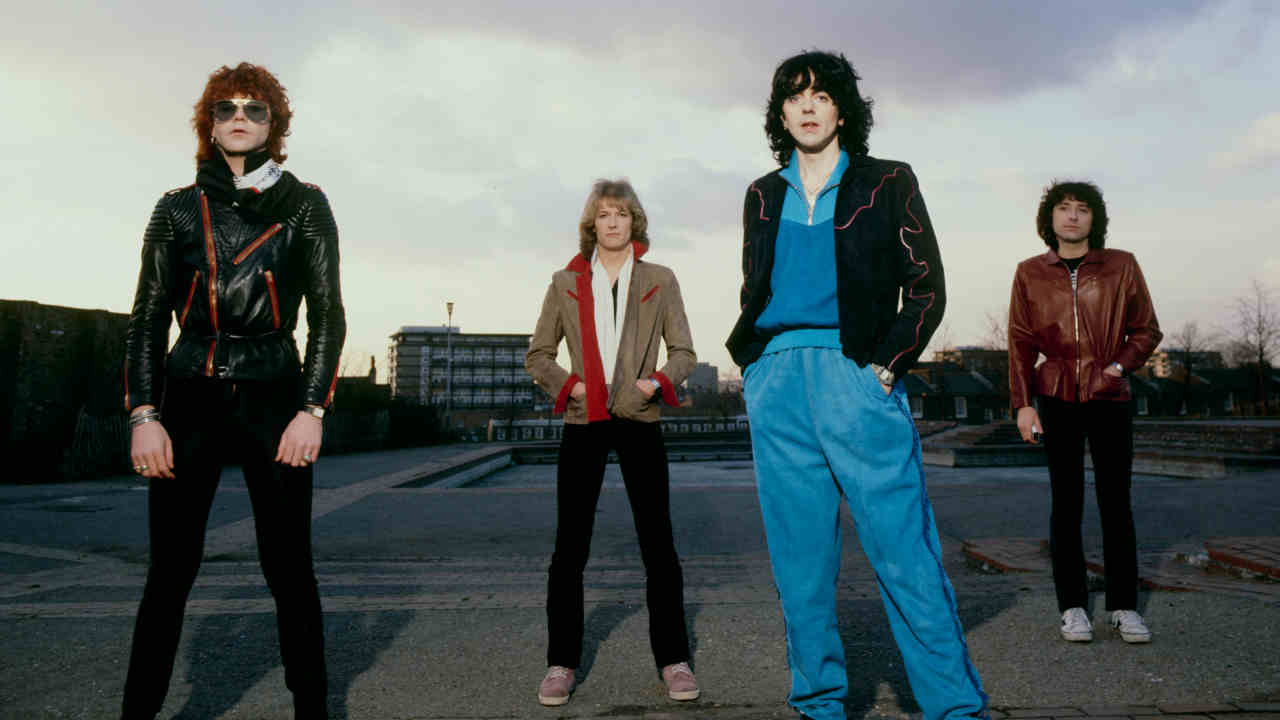
Wild Horses were the short lived group put together by former Rainbow bassist Jimmy Bain and ex-Thin Lizzy guitarist Brian Robertson. In 2009, both men looked back at a band who would have been huge if their demons hadn’t gotten the better of them.
They were the band of big-time hellraisers who could induce terror in barmen, and had the phone numbers of all the best/worst dealers in town. It’s something of a minor miracle that Wild Horses, the band formed near the end of the 70s by bassist Jimmy Bain and guitarist Brian Robertson after they’d left Rainbow and Thin Lizzy respectively, ever left the bar, let alone recorded two albums that are still regarded as cult classics.
The idea of forming a band came when Jimmy and Brian, good friends of many years’ standing, shared a London flat. “The band was born in the Bermuda Triangle of Wardour Street: the Ship [pub], the Marquee Club and the St Moritz [nightclub],” Robertson remembers. “Jimmy and I got wrecked and decided to do something together.”
Despite the obvious distractions of their den of inequity (“There were a fair amount of young ladies passing through the flat; up all night, every night,” Robbo smiles), Bain remembers that songs “flowed out pretty easily” when the chips were down.
A critical decision was who to have as lead vocalist. Although initially opposed to letting Bain (who later contributed backing vocals to both Phil Lynott’s solo albums) step up to the mic, Robertson reluctantly consented to giving the arrangement a try.
“Did it all work out in the end?” the guitarist muses now. “‘No’ would have to be the honest answer to that. We were so up our own arses, Steve Perry [ex-Journey singer] phoned us up out of the blue and wanted to join but we turned him down. I’m not kidding! Charlie Huhn [of Ted Nugent fame] also got passed over. What idiots!”
Nevertheless, Thin Lizzy’s manager Chris O’Donnell quickly picked up the band and, Robertson vaguely recalls, named them after a song on The Rolling Stones’ Sticky Fingers album. After some trial and error involving ex-Small Faces drummer Kenney Jones, then former Lone Star man Dixie Lee (a Scientologist that they locked in the equipment truck when he bored them by blathering on about his pet subject), the line-up was completed by drummer Clive Edwards and guitarist/keyboard player Neil Carter (both future UFO men).
“Neil was an excellent musician, who’d took some ribbing about his outsized nose. He’d never partied with anyone like Brian or myself,” recalls Bain, much to his amusement. “The most exciting part of his day was going home to hang out with his pet cats.”
“All of us were guilty of some pretty outrageous behaviour,” Carter marvels now, adding: “But I was never able to reach the same heights of depravity as Jimmy and Brian. Those two were creatures of the night. Trying to get them to rehearse was like knitting fog. And although I enjoyed being in a band with them it was sometimes very frustrating.”

The band’s celebrity status was confirmed when vocalist Ronnie James Dio, Bain’s colleague from Rainbow, joined them on stage at London’s Lyceum during an early show. But when it came to finding a deal, they soon discovered they had a bad reputation indeed.
At the suggestion of EMI Records, who finally stepped forwards, the band’s self-titled debut was co-produced by Trevor Rabin (later of Yes fame). “We met Trevor and felt he had enough patience to do the job for us,” Bain shrugs. “With the amount of alcohol and substances we consumed on a regular basis, it would’ve been difficult for just about anybody.”
However, the songs spoke for themselves. Founded upon Robbo’s sparkling melodic guitar runs and blessed with a generous supply of hooks, Wild Horses proved tougher and more substantial than the ‘Lizzy-lite’ that the occasional Lynott and Scott Gorham co-writing credit perhaps implied.
When Flyaway was released as a single, adverts in the music weeklies claimed: “The guitar solo you’ll remember this summer will be Brian Robertson’s on Flyaway.” And they were right. Lyrically-speaking, the band had distinct peaks and troughs, with Reservation, Bain’s paean to the plight of Native Americans, typifying one extreme, and the exploitative misogyny of singe B-side The Rapist the other.
“We were not women-haters – the exact opposite, in fact,” Bain protests. “We certainly weren’t trying to promote rape as a cool thing.” For once in agreement, Robbo adds: “Listen to some of those rap and hip-hop bands. They get away with far worse.”
No prizes for guessing where the subject matter for Dealer came from. “Absolutely not,” Bain cackles. “We were very much into substance abuse. Back then, if somebody offered me something I’d take it first and ask afterwards what it was. Even in the [later] Dio days I’d swallow a pill, wind up unconscious in the limo and have to be carried back to my room. I’m a lot less crazy now. But it’s amazing I still have a brain.”
“Brian used to drink a lot of brandy,” Carter says. “He was okay if it was a quality brand, like Courvoisier, but if they provided this stuff called Three Barrels he’d become a complete raving lunatic.”
Despite being released for the then-bargain price of £3.99 and receiving some (begrudging) press praise (“I hope there’s a future in all of this” wrote the journalist Sandy Robertson in Sounds), and the band playing some live dates with Ted Nugent and Rush, Wild Horses and its singles all failed to get a sniff of the charts.
“We were happy to continue gigging, because no matter how many people turned up each night we ended up winning them over”, Bain reflects. “But I doubt that EMI were too impressed.”
Tempers boiled over when Carter quit to join UFO, his departure forcing Wild Horses to cancel an important tour. Bain vented his disappointment in a bitter song he wrote called The Axe (‘Now you’re with the stars/You should still be in the bars’). “I saw it as a backwards step for Neil, but it was his decision,” the bassist explains. Of clambering out of the frying pan only to plunge into the fire, Carter exclaims: “As crazy as Wild Horses could be, UFO were another step up.”
Carter’s replacement, former Wildfire man John Lockton, was recommended by Joe Elliott, whose fledgling, unsigned group Def Leppard had opened for Wild Horses. But Robertson’s interest in the band was waning. Yet despite splitting his time between Wild Horses and sessions for Gary Moore’s Dirty Fingers album, Bain was forced to shoulder responsibility for the second Wild Horses record.
“Robbo became disenchanted and was drinking a lot more,” Bain recalls. “Because he was married to [model, and former Rod Stewart squeeze] Dee Harrington and harder to get hold of, I saw him less and less.”
Unfortunately the guitarist’s unhappiness manifest itself in a very public situation, during the recording of a live concert special for Radio 1.
“It was a great opportunity to be heard by people that didn’t know us,” Bain says, wincing. “I went up to the microphone and announced: ‘We’re going to play some songs from a new record. We hope you like them.’ Then Robbo, who was very drunk, stepped up and got all aggressive, saying: ‘You’d fucking well better like them.’ That comment made me shudder. It was so unprofessional. A few people just got up and left. At that point I washed my hands of him.”
Still furious, Robertson contends that his departure was fuelled by blatant deception on Bain’s part. “Jimmy was the one that screwed up the second album, putting Moog bass all over it,” he fumes. “A lot of heroin was being taken, that’s why it’s a crap album. I’m telling you, Jimmy Bain couldn’t mix cement.
“He phoned me one day to say not to come into the studio because there was a problem with the desk,” Robertson continues. “Smelling a rat after three days of the same story, I got my wife to drive me down there – only to find the band in there working, with the lights off. And who was footing the bill for them to do so? Me.”
The following day Robertson severed ties with the band and sent round a van to pick up their gear. Before long he would commence an equally tempestuous spell with Motörhead. And with Edwards opting to join former Whitesnake guitarist Bernie Marsden’s band SOS, Bain and Lockton were left holding the Wild Horses reins. A new-look line-up included the stepfather and son duo of vocalist Reuben and guitarist Laurence Archer, both formerly of Lautrec, and ex-Leppard/Lionheart drummer Frank Noon.

Getting in some retaliation of their own, Wild Horses manager O’Donnell told Sounds that Robertson and Edwards had been sacked, explaining that Robbo had “lost his craziness and charisma” and was “holding up the group’s career”.
Despite the above, Robertson’s scathing dismissal of the second Wild Horses album is harsh. Sounds boldly predicted that Stand Your Ground was capable of “establishing Wild Horses as one of the premiere rock bands of their time”. Another British paper was distinctly less thrilled, giving the terse verdict of “Horse-shit”. “That amazed me, because it’s a record I’m still very proud of,” Bain sighs.
Like its predecessor, Stand Your Ground also fell short of the charts. The revised personnel played a well-received show at London’s Marquee Club, with Phil Lynott once again dropping by to join the fun on stage. But when EMI withdrew their support a few dates into a tour, the writing was on the wall. So the news that the Archers and Noon were quitting (to form Stampede) made the group’s demise inevitable. (Laurence Archer went on to link up with Phil Lynott’s post-Lizzy band Grand Slam, then join the growing list of those who defected to UFO.) “I didn’t know anything about their mass exodus until I read about it in a music paper,” Bain chuckles ruefully. “It kind of explained why the last couple of rehearsal sessions hadn’t been too good.”
The best explanation for Wild Horses’ underachievement is, of course, that its two main protagonists grew apart. But the perception also exists that they became too much of a ligger’s band – something their star-studded guest lists at the Marquee supports.
“I suppose I can understand why people might think that,” Bain concedes. “But Phil [Lynott] and all the rest of those guys were good friends. We saw them as part of the band even though they weren’t members. Phil wanted to give us a shove in the right direction, and when he set his mind on something it was hard to say no – not that we really tried.”
Neil Carter, who went on to have a spell in Gary Moore’s band, agrees that being associated with Lynott wasn’t always beneficial. “I never actually heard the second album,” he says, “but with the twin-guitar thing going on it was sometimes assumed that we were a pale imitation of Lizzy.”
It’s no surprise that these days Jimmy Bain and Brian Robertson have very different opinions regarding the potential of a Wild Horses reunion.
“I’d absolutely be interested in doing something again with Brian,” Bain enthuses, almost as though the notion is occurring to him for the very first time. “That would be fantastic.”
Robertson, however, hasn’t spoken to his former partner in years – and prefers that it remains that way. “As a band, we were on the right track at the start, but drugs and booze made us lose our way,” Robbo sums up. “Putting Wild Horses back together is not really top of my Christmas list – this year or any other.”
Originally published in Classic Rock issue 110. Since this piece originally appeared, Jimmy Bain passed away in 2016.







